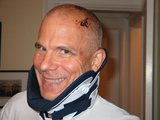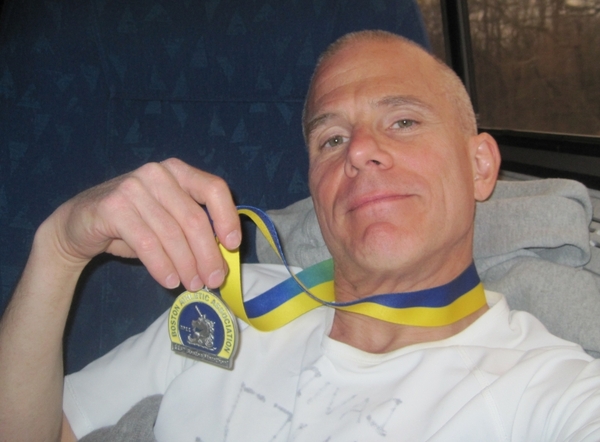 So I’m driving along a two-lane highway in upstate New York on a pleasant afternoon in May, with two of my four kids in the back seat: Josie, my stepdaughter, almost nine years old; and my daughter Gabriela, eight. One of them says, hey my iPod battery has run down. Let me see that, say I, and start to fumble with the iPod and a charging device. Now I look up and see I have drifted into the left lane and say oh shit — steering wheel in my left hand, iPod in my right — and overcorrect to the right. Next thing I realize is that we are going off the road, and I have enough time to think, ok, we are going off the road, what next? Next is that terrible sound and sensation of thud. Then I realize that we are upside down, and I am thinking, ok, this isn’t good, and start trying to figure out how to extricate myself, having forgotten for the time being about the girls. That’s the last thing I remember until an indeterminate number of minutes later, when I’m on my back being questioned by paramedics.
So I’m driving along a two-lane highway in upstate New York on a pleasant afternoon in May, with two of my four kids in the back seat: Josie, my stepdaughter, almost nine years old; and my daughter Gabriela, eight. One of them says, hey my iPod battery has run down. Let me see that, say I, and start to fumble with the iPod and a charging device. Now I look up and see I have drifted into the left lane and say oh shit — steering wheel in my left hand, iPod in my right — and overcorrect to the right. Next thing I realize is that we are going off the road, and I have enough time to think, ok, we are going off the road, what next? Next is that terrible sound and sensation of thud. Then I realize that we are upside down, and I am thinking, ok, this isn’t good, and start trying to figure out how to extricate myself, having forgotten for the time being about the girls. That’s the last thing I remember until an indeterminate number of minutes later, when I’m on my back being questioned by paramedics.
According to what I’ve been told, another motorist driving behind us saw the whole thing and came to our aid. We had gone into the ditch on the right of the road and rolled one and a half times. She helped each of us out through the holes where the windows had formerly been. I am told I was conscious and talking, though I remember none of this. She then got my wife Amy’s phone number from Josie, and called her. Amy set out driving the five-plus hours to where we were, with our other two kids coming along for lack of any child care.
I can remember having trouble reciting my address when asked by the paramedics, and being told that we would take a helicopter ride to a hospital better equipped for head traumas than the nearest place, which happened to be half a mile from the site of the accident. Josie and Gabriela were taken there, and got lousy care. Josie had been briefly unconscious and had a gash on her leg below the knee, good for ten stitches; Gabriela had some cuts on her hand but was otherwise relatively unscathed. The personnel attending to Josie should have had the sense to follow standard protocols for kids who have likely concussions, but did not. We got her proper follow-up care after we got home.
The girls told me that as we were about to be loaded into our respective ambulances, I gave them the thumbs-up sign. It’s gratifying to hear that I tried to give them some proper parental reassurance.
I recall some of the helicopter ride, such as lying on the floor as the paramedics cut me out of my clothes. Have you ever had the thought — or had someone tell you — as you were getting dressed, that you should wear nice underwear in case you get into a serious accident? As we were preparing to leave for this trip — the return trip following a weekend at my parents’ house — I was looking around for clean underwear, and had trouble finding some. So I said the hell with it, and pulled on my jeans. It’s a safe bet that the paramedics were unfazed by the sight of my dick.
As we flew along I said to them that I usually had plenty of snappy jokes but was sorry that I could not come up with anything at the moment. They said don’t worry about it. It seems that when we’re in crisis, sometimes our minds want to cling to normality. I have this image of myself as affable and funny, so I wanted to be affable and funny.
I was thirsty and asked them for water. They said, sorry, we can’t give you any because you might have to go right into surgery. I thought it unfortunate that they couldn’t give me water because I was thirsty; I was indifferent to the prospect of surgery. I asked whether the girls were ok, and recall hearing one of paramedics remark to the other that it was the third time in ten minutes I had asked that same question — the point being not that I was annoying but that I had a head injury.
There came a moment in which I thought, this is what is happening and I do not like it, but I don’t have to like it. Just be present to what is. That’s what we call Practice.
The first few hours at the hospital are vague. Someone gave me a phone and I spoke to my wife, and ex-wife, crying into the phone with anguish at having rolled the car with our kids in it. I was assured the girls were OK. I remember being presented with the standard forms on a clipboard, and a pen. I was trying to read, lying flat on my back with the clipboard blocking my light, and no reading glasses. I was particularly interested in finding the agreement to pay clause so I could cross it out and initial it, this being my invarying practice. I tried to sit up to get better light, and got into a bit of an argument with my handlers, telling them I do not sign open-ended guarantees to pay arbitrary sums of money for yet-to-be-determined services, insurance notwithstanding. (In fact, no one should ever agree to these terms, but should resist in self-defense and as protest against the broken healthcare system.) They finally said forget it, don’t sign.
I had a concussion, cervical fracture and scalp lacerations. The neurosurgeon told me I was lucky, which struck me as rather a strange remark until I realized that he meant relative to what might have happened. Curiously, these injuries haven’t been particularly painful. People kept offering me morphine, and I would say, no thanks, what for? I wanted to be lucid to enjoy my wife’s eventual arrival. Finally she did, no thanks to the utter lack of signage pointing the way to this primitive outpost in rural Pennsylvania. She stayed with me as much as she could, and spent the night on a chair in the waiting area when they kicked her out of the ICU.
A guy punched staples into my scalp, in a scene reminiscent of the movie The Wrestler. It was painful, so I was joking that it didn’t hurt, and was that the best he could do? As he finished the job, he said he was done but he could give me another staple if I wanted. Not really, I confessed.
About 24 hours after I was admitted, some physical therapists got me out of bed, walked me around the ward and pronounced me fit to leave. My wife drove us all back home to New Jersey, where I convalesced for a month.
Staying out of work was a pleasure. The first few days were difficult, because I was banged up, but the rest was a joy. If retirement is like this, I’m ready. My neurosurgeon told me we could not even discuss running for two months. After nearly fainting from the initial shock (I am a devoted distance runner), I recovered almost immediately, resigning myself to reality and realizing that worrying doesn’t help.
I spent my days shuffling around the house, gradually doing more activities like housework, and taking advantage of the free time to do more zazen than usual. Paperwork and phone calls about insurance and medical bills also consumed substantial amounts of time. The financial impact of lost wages, replacing the car, etc., is non-trivial but tolerable.
Spending ten hot summer weeks in a neck brace also sucked, but I tolerated it without complaining overly much. I came out of the neck brace in early August; at the end of September I ran a half-marathon within the moderately ambitious goal of 1:40:00 that I had set, finishing in 1:38:48. This result is far from a personal record, but coming just a few months after being airlifted away from an auto accident, I accept it with gratitude.



